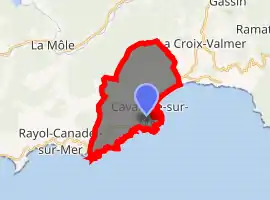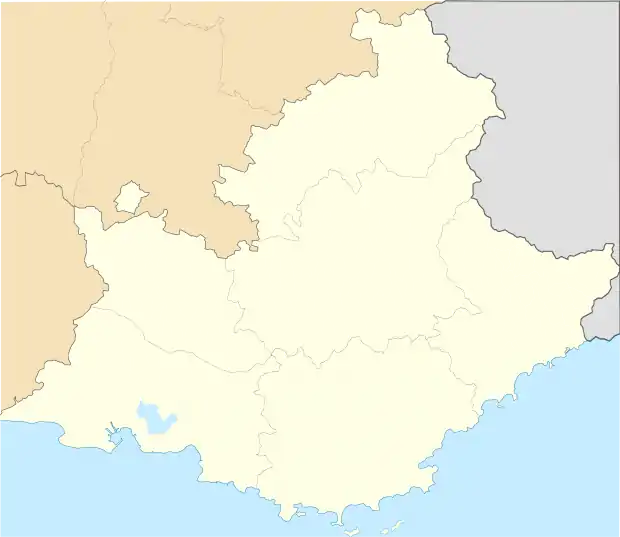Cavalaire-sur-Mer
Cavalaire-sur-Mer (pronounced [kavalɛʁ syʁ mɛʁ]; Provençal: Cavalaira de Mar or simply Cavalaira) is a commune in the Var department in the Provence-Alpes-Côte d'Azur region in southeastern France.
Cavalaire-sur-Mer
| |
|---|---|
.jpg.webp) An aerial view of the bay and the harbour of Cavalaire-sur-Mer | |
.svg.png.webp) Coat of arms | |
Location of Cavalaire-sur-Mer 
| |
 Cavalaire-sur-Mer  Cavalaire-sur-Mer | |
| Coordinates: 43°10′19″N 6°31′47″E | |
| Country | France |
| Region | Provence-Alpes-Côte d'Azur |
| Department | Var |
| Arrondissement | Draguignan |
| Canton | Sainte-Maxime |
| Government | |
| • Mayor (2020–2026) | Philippe Leonelli[1] |
| Area 1 | 16.74 km2 (6.46 sq mi) |
| Population (2017-01-01)[2] | 7,385 |
| • Density | 440/km2 (1,100/sq mi) |
| Time zone | UTC+01:00 (CET) |
| • Summer (DST) | UTC+02:00 (CEST) |
| INSEE/Postal code | 83036 /83240 |
| Elevation | 0–528 m (0–1,732 ft) (avg. 150 m or 490 ft) |
| 1 French Land Register data, which excludes lakes, ponds, glaciers > 1 km2 (0.386 sq mi or 247 acres) and river estuaries. | |
History
Cavalaire-sur-Mer is probably derived from an ancient Phoenician colony of the name of Heracles Caccabaria. There are also remains of a Gallo-Roman occupation in Pardigon.
The town was detached from Gassin in 1929.
The village is located on the route of the old railway Saint Raphael–Toulon (sometimes called Train Pignes), now defunct. However, the location of the old railway line can be noted and its path followed (and in much of the coast from Le Lavandou to St. Raphael, Cavalaire is even a "Road Train Pignes").
During World War II, on August 16, 1944, it was one of the sites of a beach landing in Operation Dragoon, the Allied invasion of southern France. Every year, August 15 sees a parade of military vehicles and the reconstruction of a military camp.
Its sister city is New Port Richey, Florida.
See also
References
- "Répertoire national des élus: les maires". data.gouv.fr, Plateforme ouverte des données publiques françaises (in French). 2 December 2020. Retrieved 7 December 2020.
- "Populations légales 2017". INSEE. Retrieved 6 January 2020.